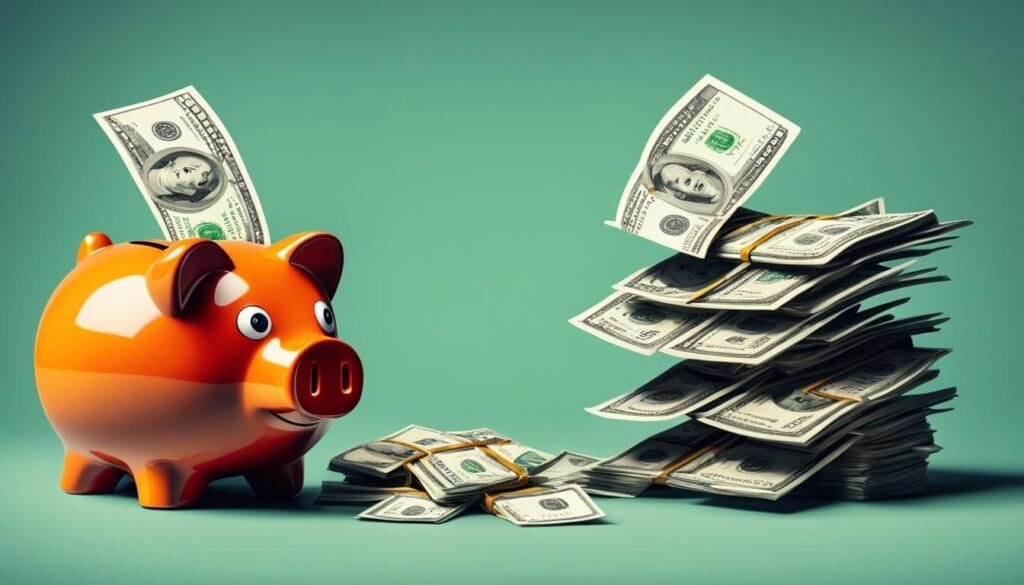Welcome to our in-depth exploration of credit card psychology, where we delve into the intricate understanding of credit card behavior, spending habits, and the psychology behind credit card debt. This topic is essential for anyone looking to navigate the complex world of credit cards and maintain a healthy financial well-being.
Credit cards have become a ubiquitous part of modern life, offering convenience and flexibility. However, the way we interact with credit cards can have a profound impact on our financial health and overall psychological well-being. Understanding the underlying psychology can empower individuals to make informed decisions and avoid falling into the trappings of excessive debt.
One crucial aspect of credit card psychology is the influence of narcissism on financial behavior. Narcissists, with their self-focused and manipulative tendencies, often use money as a tool to exert power and control over others. From secrecy about their finances to being hypocritical and punitive with money, dealing with a narcissist’s financial behavior can have far-reaching consequences.
By unraveling the psychology behind credit card use, we can equip ourselves with the knowledge needed to navigate the challenges and pitfalls associated with credit card debt. From the impacts of credit card spending habits to the consequences of accumulation, understanding the psychological factors at play can help individuals take control of their finances and protect themselves from narcissistic financial traps.
Join us as we dive deep into the intricacies of credit card psychology, shedding light on the unseen forces that shape our credit card behavior and providing valuable insights on how to build immunity to narcissistic financial behavior. Let’s empower ourselves with the knowledge to make smart financial decisions and secure our financial well-being.
Key Takeaways:
- Understanding credit card psychology is essential for managing finances effectively.
- Credit card behavior is influenced by narcissism and its toxic money habits.
- Credit card spending habits can lead to impulsivity and emotional spending.
- Credit card debt can have severe consequences on financial well-being and credit scores.
- Building immunity to narcissistic financial behavior involves developing certain qualities and setting boundaries.
The Impacts of Credit Card Spending Habits
Credit cards have revolutionized the way we make purchases, offering convenience and flexibility. However, they have also contributed to a concerning trend of emotional spending and impulsive buying. Many individuals struggle with managing their credit card impulses, leading to negative effects on their financial security and overall well-being.
Emotional spending and credit cards often go hand in hand. The ease of swiping a card can disconnect us from the reality of our financial situation, making it tempting to indulge in purchases we don’t really need. This impulsive behavior can quickly accumulate debt and strain our financial health.
One of the main reasons people struggle with credit card decision-making is a lack of self-control. Without a clear plan or budget, it becomes easy to overspend and fall into the trap of impulsive buying. However, by implementing simple strategies, such as creating a budget and tracking expenses, individuals can regain control over their credit card impulses.
Interest rates on credit cards can also significantly impact our financial well-being. If balances are not paid off in full each month, the interest charges can make purchases more expensive in the long run. It is crucial to be mindful of the interest rates associated with credit cards and to weigh the cost of carrying a balance against the value of the purchase.
Managing Credit Card Impulses
To manage credit card impulses effectively, setting clear boundaries is essential. This involves developing discipline and saying “no” to excessive spending. By understanding our financial goals and aligning our purchases with those goals, we can make informed decisions and avoid falling into the emotional spending trap.
“Impulse buying is simply the act of giving in to immediate desires and emotions without considering the long-term consequences. It is crucial to have a solid plan in place and stick to it to prevent impulsive credit card usage.”
Creating a list of criteria for purchases can also help manage credit card impulses. Before making a purchase, ask yourself, “Is this item essential?” or “Will it bring long-term value?” By evaluating purchases through a critical lens, you can reduce unnecessary spending and make more intentional choices.
Another effective strategy is to set spending limits on credit cards. This can be done by establishing a predetermined credit limit or using a prepaid credit card with a fixed balance. By having a cap on spending, it becomes easier to control impulsive purchases and maintain financial stability.
Overall, managing credit card impulses is crucial for maintaining financial security and avoiding the negative impacts of emotional spending. By implementing strategies such as creating a budget, setting boundaries, and thinking critically about purchases, individuals can develop healthier credit card habits and protect themselves from financial strain.
The Impacts of Emotional Spending on Credit Card Debt
| Impacts of Emotional Spending | Consequences |
|---|---|
| Accumulation of debt | Financial strain and difficulty in paying off balances |
| Lowered credit score | Negative impact on borrowing ability and future financial opportunities |
| Inability to meet financial goals | Limited progress towards savings and financial stability |
| Increased stress and anxiety | Reduced overall well-being and mental health |
The Consequences of Credit Card Debt
Accumulating credit card debt can have severe consequences. When individuals fail to manage their credit card usage effectively, it can lead to financial difficulties and damage their credit scores. Let’s explore the repercussions of credit card debt and understand the psychology behind it.
Cognitive Biases and Credit Card Usage
Cognitive biases play a significant role in credit card usage and debt accumulation. These biases are systematic errors in thinking that influence our decision-making processes. When it comes to credit cards, certain biases can lead to impulsive spending and overspending.
“Credit cards can create a false sense of wealth, making it easier for individuals to overspend and fall into debt.”
For example, the availability heuristic bias can make individuals focus on immediate gratification and discounts offered by credit cards, without considering the long-term consequences. Additionally, the loss aversion bias can make individuals more inclined to spend in order to avoid missing out on rewards or benefits, without considering the impact on their financial well-being.
Credit Card Mindset and the Psychology of Rewards
Understanding the credit card mindset and the psychology of rewards is crucial in avoiding unnecessary debt. Credit card rewards programs often entice individuals to spend more in order to earn rewards or points. While these rewards can be beneficial when managed responsibly, they can also lead to overspending and impulse buying.
| Credit Card Mindset | Psychology of Rewards |
|---|---|
| Emphasizes immediate gratification | Encourages spending to earn more rewards |
| Lacks awareness of long-term consequences | Triggers impulsivity and emotional spending |
| Focuses on short-term benefits | May overshadow financial stability |
By recognizing these biases and adopting a mindful approach to credit card usage, individuals can make informed decisions, avoid unnecessary debt, and maintain financial stability.

The Impact on Credit Scores and Beyond
Accumulating credit card debt can have far-reaching consequences beyond financial difficulties. High-interest rates on unpaid balances can make it challenging for individuals to pay off their debt, leading to a negative impact on credit scores.
Poor credit scores can affect various aspects of an individual’s life, including:
- Higher insurance premiums
- Difficulties in obtaining loans or credit
- Limited job prospects, especially in roles requiring financial responsibility
- Challenges in securing a mortgage or favorable interest rates
It’s essential to understand the potential consequences of credit card debt to make informed decisions and maintain a healthy financial profile.
Building Immunity to Narcissistic Financial Behavior
Building immunity to narcissistic financial behavior involves developing certain qualities that turn off narcissists and help individuals heal from narcissistic relationships.
Indifference to a narcissist’s need for validation and setting clear boundaries can deter narcissists from controlling financial decisions.
“Indifference to a narcissist’s need for validation can be a powerful tool in asserting your own financial autonomy. By not catering to their demands and expectations, you strip them of the control they seek.”
Recognizing manipulative tricks is crucial in protecting oneself from narcissistic financial behavior. Trusting intuition and listening to one’s gut instincts can help identify red flags and avoid falling into financial traps set by narcissists.
It is also essential to find meaning outside of romantic relationships, as narcissists often use financial manipulation as a means of control. Cultivating hobbies, relationships, and personal growth can strengthen one’s psychological well-being and reduce dependency on toxic partners.
The Power of a Secure Attachment Style
Working towards a secure attachment style can also boost narcissism immunity. Building relationships based on trust, reciprocity, and healthy communication can protect individuals from the harmful effects of narcissists’ financial behaviors.
Being aware of patterns in relationships is crucial in breaking free from the cycle of narcissistic abuse. Understanding the dynamics of narcissistic behavior and recognizing similar patterns in future relationships can help individuals make informed decisions and protect their financial well-being.
Protecting Your Financial Independence
Building immunity to narcissistic financial behavior requires a proactive approach in protecting one’s financial independence. This involves:
- Establishing separate bank accounts and maintaining control over personal finances
- Keeping financial information secure and not sharing sensitive details with a narcissistic partner
- Seeking professional guidance from a financial advisor or therapist specialized in narcissistic abuse
By implementing these strategies and developing a strong sense of self, individuals can boost their narcissism immunity and guard against the harmful effects of narcissistic financial behavior.

Key Takeaways
- Indifference to a narcissist’s need for validation and setting clear boundaries can protect against financial manipulation.
- Recognizing manipulative tricks and trusting intuition are essential in avoiding financial traps.
- Finding meaning outside of romantic relationships and working towards a secure attachment style can enhance narcissism immunity.
- Being aware of relationship patterns and learning from past experiences can protect against future financial exploitation.
- Protecting financial independence through separate accounts and seeking professional guidance can further strengthen narcissism immunity.
What Are the Reasons Experts Disapprove of Credit Card Psychology?
Credit card psychology experts disapprove of the way credit card companies manipulate consumer behavior. They argue that tactics like hidden fees, minimum payments, and rewards programs can lead to overspending and debt. These experts believe that understanding these tactics can help consumers make more informed financial decisions.
Conclusion
Understanding credit card psychology is essential for effectively managing your finances and avoiding the negative consequences of narcissistic financial behavior. One key aspect to focus on is maintaining a healthy credit utilization ratio. This ratio refers to the percentage of your available credit that you are currently using. A good credit utilization ratio is generally considered to be below 30%. By keeping your credit card balances low and using credit responsibly, you can achieve a good credit utilization ratio and improve your credit score.
Practicing self-control is another crucial element in managing credit card usage. Being aware of the psychological triggers that can lead to impulse spending and emotional purchases can help you make more informed decisions. By setting clear boundaries and saying “no” to excessive spending, you can protect yourself from falling into the financial traps set by narcissists.
Awareness of manipulative tactics is also important in safeguarding your financial well-being. By recognizing the signs of narcissistic financial behavior, such as secrecy about money, hypocrisy, and punitive actions, you can better protect yourself and your finances. Trusting your intuition and being cautious in financial relationships can help you navigate these challenges.
In conclusion, unlocking the secrets of credit card psychology empowers individuals to take control of their financial mindset and avoid unnecessary debt. By maintaining a good credit utilization ratio, practicing self-control, setting boundaries, and being aware of manipulative tactics, you can make informed decisions about your credit card usage, protect yourself from the negative impacts of narcissistic behavior, and ultimately improve your financial future.
FAQ
What is credit card psychology?
Credit card psychology refers to the study of consumer behavior and decision-making patterns related to credit card usage. It involves understanding why people make certain spending choices, the emotions that influence their behaviors, and the cognitive biases that can impact their financial decisions.
How can credit card spending habits affect our lives?
Credit card spending habits can have a significant impact on our financial security and overall well-being. Impulse buying and emotional spending can lead to overspending and accumulating debt. Additionally, poor credit card decision-making can strain relationships and hinder financial goals.
What are the consequences of credit card debt?
Accumulating credit card debt can lead to severe consequences. High-interest rates and unpaid balances can result in financial difficulties and damage credit scores. Poor credit scores can impact insurance premiums, job prospects, and mortgage eligibility.
How do cognitive biases and credit card usage relate?
Cognitive biases, such as the tendency for immediate gratification and the influence of social proof, can affect credit card usage. These biases can lead to impulsive spending decisions and the accumulation of unnecessary debt. Understanding these biases is key to making more informed choices about credit card usage.
How can I build immunity to narcissistic financial behavior?
Building immunity to narcissistic financial behavior involves developing qualities that help deter narcissists and promote personal healing. These qualities include indifference to a narcissist’s need for validation, setting clear boundaries, recognizing manipulative tricks, and building secure attachment styles.
Why is understanding credit card psychology important?
Understanding credit card psychology is crucial for managing finances effectively and avoiding the negative impacts of impulsive spending and narcissistic financial behavior. It can help individuals make informed decisions about credit card usage, protect themselves from financial traps, and maintain healthy credit scores.
Source Links
- https://www.investopedia.com/articles/younginvestors/08/purchase-financing.asp
- https://www.cnbc.com/2022/04/14/narcissists-share-these-5-toxic-money-habits-that-are-often-ignored-says-psychologist.html
- https://www.usatoday.com/story/life/health-wellness/2023/09/26/narcissists-hate-these-traits-use-them-to-build-narcissism-immunity/70964942007/

